Lessons from the kitchen is a place where, through text and image, we think, develop ideas, shares stories from köks everday gatherings, as well as reflect on our position, strategy and forms of resistance.
Den 12 juni 2021 serverade kök och Kvinnocenter i Tensta-Hjulsta personliga matberättelser på Tensta Konsthall.
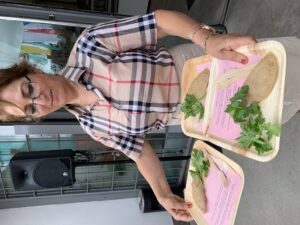
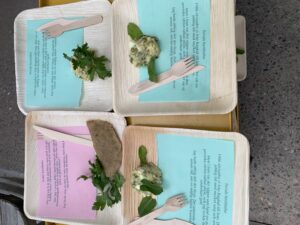
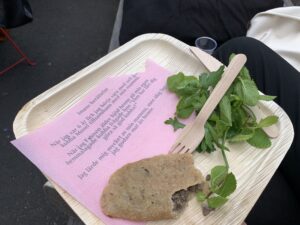
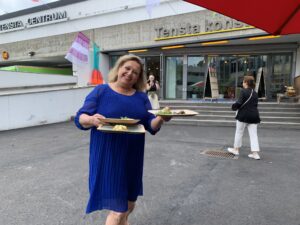
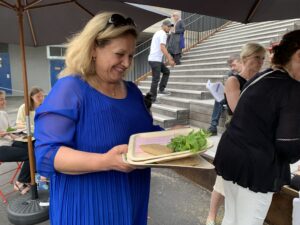
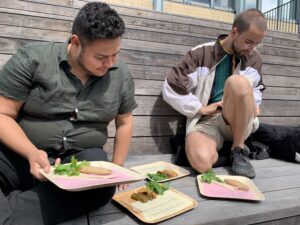
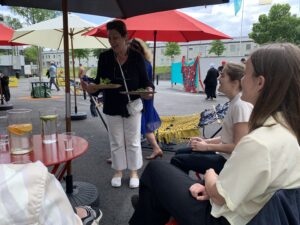
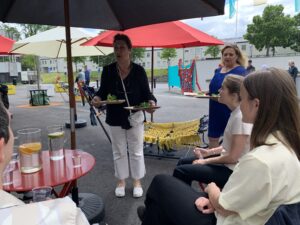
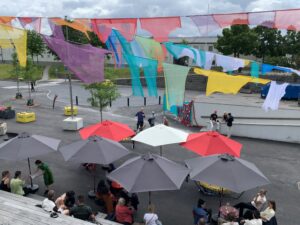
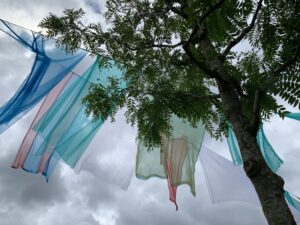
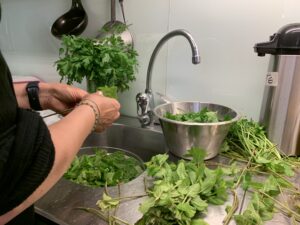
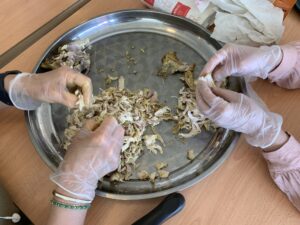
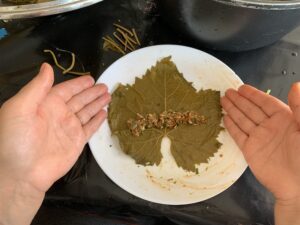
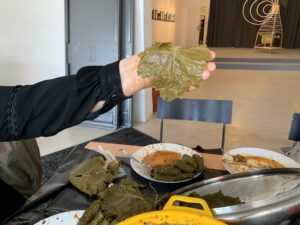
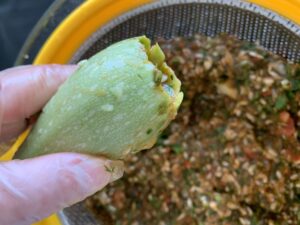
Karima skriver:
Jag heter Karima och jag älskar att jobba med tårtor och skapa olika former. Den här gången ville jag jobba med former gjorda av marshmallow och socker, blandat med olika färger. Jag fick hjälp av medlemmarna i kök.
Tack att jag är med i gruppen och att jag fick visa lite av mina kunskapar.
Lite av jobbet kan ni se i filmen, och inte minst vår glädje.
Tack så mycket.
Tack alla.
Karima
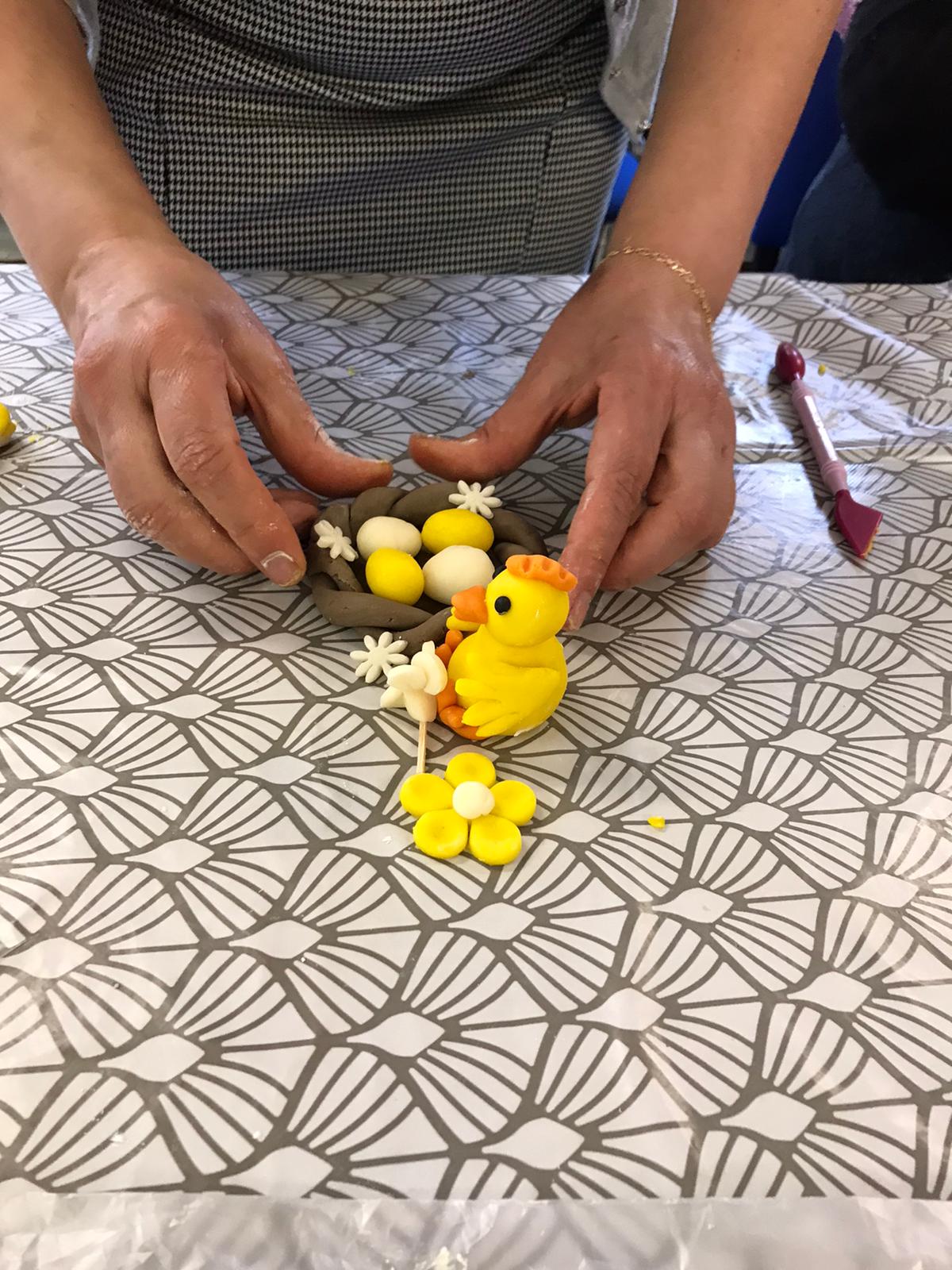
I fredags träffades vi på kvinnocenter, som vi alltid brukar göra. Men denna gång skulle vi inte stanna där utan vi skulle besöka några av de deltagarna som inte hade kunnat vara med på länge. Vi hade förberedde te och kaffe, och sedan promenerade vi till Nouras lägenhet. Noura stod på sin balkong, högt upp i det blå och hälsade på oss som stod på marken. Vi sjöng för henne och gav henne en chokladask formad som ett hjärta. Nästa person vi besökte var Wafa. Hon gick ner för trapporna och kom ut på gården där vi bjöd henne på kaffe. Petra delade bröd med alla. Foccaccia. Alla älskade brödet. Sedan besökte vi Gülgun och Hikmet. De bor i samma hus, och åter sjöng vi och gav dem den hjärtformade chokladen. Det var fantastiskt att denna dag kunna dela glädje med de vi inte träffat på så länge, att genom vår närvaro, varmt te och kaffe, sång och lite choklad uttrycka vår kärlek och saknad. Till råga på allt, solen sken och marken var täckt av vit snö, vilket fick mig att tänka på en bruddräkt. Vi skrev meddelande i snön till varandra och världen som tecken på vår tillgivenhet till varandra. Och jag hoppas innerligen att vi snart kan ses utan närvaro av corona.
Skriven av Muna
The short dark January days in Stockholm are often brightened by snowfall. It lays a carpet of crystals that transform the world around us. For k.ö.k to still meet up during this Winter and pandemic we have also transformed our time of cooking and eating together in cosy self-built spaces to a series of outdoor walks, exploring the locality or special sites that we guide each other around. After a wet Winter that has seen us crunch through gravel and drink coffee from flasks in biting winds, the snow brought welcome new terrain to navigate. As we set off carefully so as not to slide our way down onto Järvafältet we learned it was two of the member’s birthdays (M and R) and the sun that we had not seen in weeks broke through the clouds. The dazzling quiet open field was interrupted with our birthday songs and laughter and new foot prints making our way to Eggeby Gård, which is hibernating through this pandemic Winter. We stopped at a bench there and unpacked a picnic with treats and tea. As another round of ‘happy birthday’ was sung, camera phones came out and portraits and group pictures were amassed as the snow offered the perfect backdrop. Before feet froze we packed up and walked back talking of plans for other walks and the perspective that while we miss being close and relaxed inside, we are finding new ways to share our experiences and knowledge together. The cold air enters our lungs and leaves warm.
The short dark January days in Stockholm are often brightened by snowfall. It lays a carpet of crystals that transform the world around us. For k.ö.k to still meet up during this Winter and pandemic we have also transformed our time of cooking and eating together in cosy self-built spaces to a series of outdoor walks, exploring the locality or special sites that we guide each other around. After a wet Winter that has seen us crunch through gravel and drink coffee from flasks in biting winds, the snow brought welcome new terrain to navigate. As we set off carefully so as not to slide our way down onto Järvafältet we learned it was two of the member’s birthdays (Muna and XX) and the sun that we had not seen in weeks broke through the clouds. The dazzling quiet open field was interrupted with our birthday songs and laughter and new foot prints making our way to Eggeby Gård, which is hibernating through this pandemic Winter. We stopped at a bench there and unpacked a picnic with treats and tea. As another round of ‘happy birthday’ was sung, camera phones came out and portraits and group pictures were amassed as the snow offered the perfect backdrop. Before feet froze we packed up and walked back talking of plans for other walks and the perspective that while we miss being close and relaxed inside, we are finding new ways to share our experiences and knowledge together. The cold air enters our lungs and leaves warm.

Detta är en hyllning till Kvinnocenter i Tensta-Hjulsta, och till andra liknande kvinnocenter och kvinnoföreningar på andra platser i Sverige.
Jag tänker på min mamma när jag är på kvinnocenter. Inte för att min mamma besöker kvinnocenter, snarare tvärtom. Kvinnocenter är en plats för gemenskap och vänskap, något som min mamma saknar. Jag har försökt att locka med henne till kvinnocenter, men utan framgång. Min mamma lever isolerad i sin lägenhet. Hon känner sig ensam, och de enda hon pratar med i vardagen är med sin granne, min syster och med mig. Hon har inga egentliga vänner. Hon känner att ingen bryr sig om henne. Å andra sidan, kontaktar hon inte heller någon och frågar hur de mår. Inte ens sina barn. Hon vill inte störa andra. Jag önskar min mamma var en av kvinnorna på kvinnocenter. Nej, fel – jag önskar min mamma var lika modig som andra kvinnor på kvinnocenter i att delta och våga visa sin sårbarhet. Det finns många blyga, ensamma och utsatta kvinnor. På kvinnocenter blir kvinnor sedda och bekräftade. Det är en plats för gemenskap, en plats där alla kvinnor kan bidra efter sin förmåga, utbyta kunskap och tjänster. Här formas vänskap, glädje och sorg delas. För mig finns det en enorm kraft i det. Jag önskar min mamma kunde få uppleva vad jag har upplevt på kvinnocenter, och den inspiration och kraft som detta innebär. Jag önskar att varje kvinna hade ett kvinnocenter att gå till.
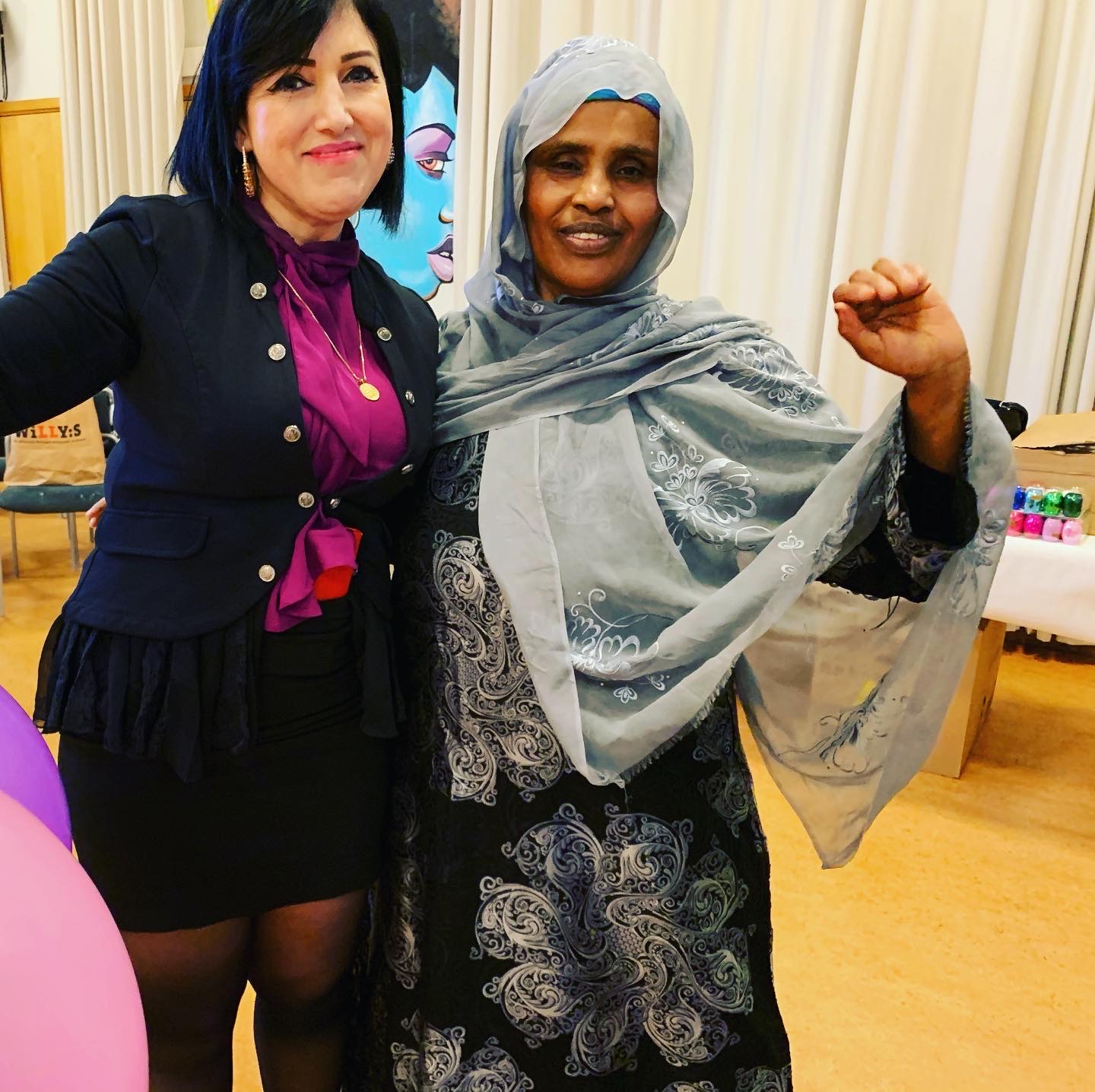
Between 9-15 October 2019 k.ö.k organised a workshop on Radical Care with Indonesian Art Collective Ruangrupa. We spent a number of days together at the Women’s Centre in Tensta/Hjulsta before heading out to the Stockholm Archipelago for a weekend camp together with students from the Royal Institute of Art in Stockholm, to think and practice together what Radical Care might mean.
Below a few fragments from the weekend we shared.
1.
The kitchen door swings open to reveal a whirl of activity – mixing, frying, chopping, stirring. Hands are passing each other plates, knives, dirty dishes. There are familiar voices, new acquaintances, old friends all blurred together, working like they had been running a kitchen to feed fifty for years. Languages can be heard over the rush of water and spat of frying, Swedish, Arabic, Kurdish, Spanish but at a higher volume are the gesticular movements of hands, bodies, faces, communicating methods of cooking, better ways to chop an onion, the need for more water.
And then the lights go out.
A roar of laughter and then the quite murmur of continued work as some grab candles and mobile phone torches. No panic, just smiles in agreement that our newly formed collective would figure it out.
And then the water went off.
Another roar of laughter, a few questions, ‘should we use the water from the sea to wash up? May be can drive to get water in the morning? I need water to take my medicine….followed by a return to the hum of collective maintenance work.
2.
A wood fire sauna has been tended since lunchtime. It sits on the edge of a grassy bank leading down to a jetty stretched out into the clear water of the Stockholm archipelago. Some walk to the sauna as a gentle rain begins, they are glad to enter the warmth of its entrance. On their way there, there was talk of sexual orientation, having children with our friends and the desire for other modes of living. The weekend had seen a collective expand not only with new friends and meetings but with the intensity of living together outside the buzz of the urban routine. For some this was their first trip out of the city, a journey possible to take when not alone. Undressing, there was no flash of embarrassment. Instead, talk of post-cancer breast operations and the artistry of tattooed nipples. In the sauna other bodies joined, relaxed, laughing, chats in multiple languages, translating, laughing again. Aching bodies were squeezed and massaged, roles shifting between receiving and giving care.
And then….too hot and a run, a slip, a jump into the ice cold sea.
3
A minute of silence to pay respect to others in places far from our archipelago dwelling. A minute of reflection amongst the continuous bubble of voices, tea making, water fetching, cleaning, carrying, complaining. A gesture of alliance and solidarity.
A political critique, to remind us of the radical struggles going on in the world, as we cosy up over a cup of coffee to talk about care. The reminder points us toward activities taking place outside of Sweden, outside of Europe that speaks to different bodies within our temporary collective in different ways. To some it is a moving reminder of the continuous fight of liberation movements, to others it is a reminder of trauma, wounds that never heal. What care can we take in sharing our solidarity with different people? What care is in a reminder which re-politicises bodies which in Sweden are already always politicised? How does it conform to a world view that isn’t able to see some people’s depoliticising, their refusal to be reduced to one reading, a way of doing politics in other ways?
A voice, ‘we have come here to have a weekend together away from politics, to be together and not bring all that other stuff we are always burdened with here’.
4
How can we care to accommodate our many differences? How can we care across political, cultural, economic, generational divides? How can we not generalize care but pay close attention to the specificities of care for each relation, each situation? And what sensitivities do we need to develop a practice of radical care that raises critical questions that we commit to work through together? How do we not care too much, and in our efforts control someone else’s capacity to care for themselves, or burn out from the burden of it?
How can we describe caring in a world that trains us to not care at all?
When care is as overwhelming as it is emancipating?
When it is as thick and messy, as it is clear and concrete?
When it is as precarious as it is constant?
When it feels like a buzzing kitchen and a squeeze of the shoulder?
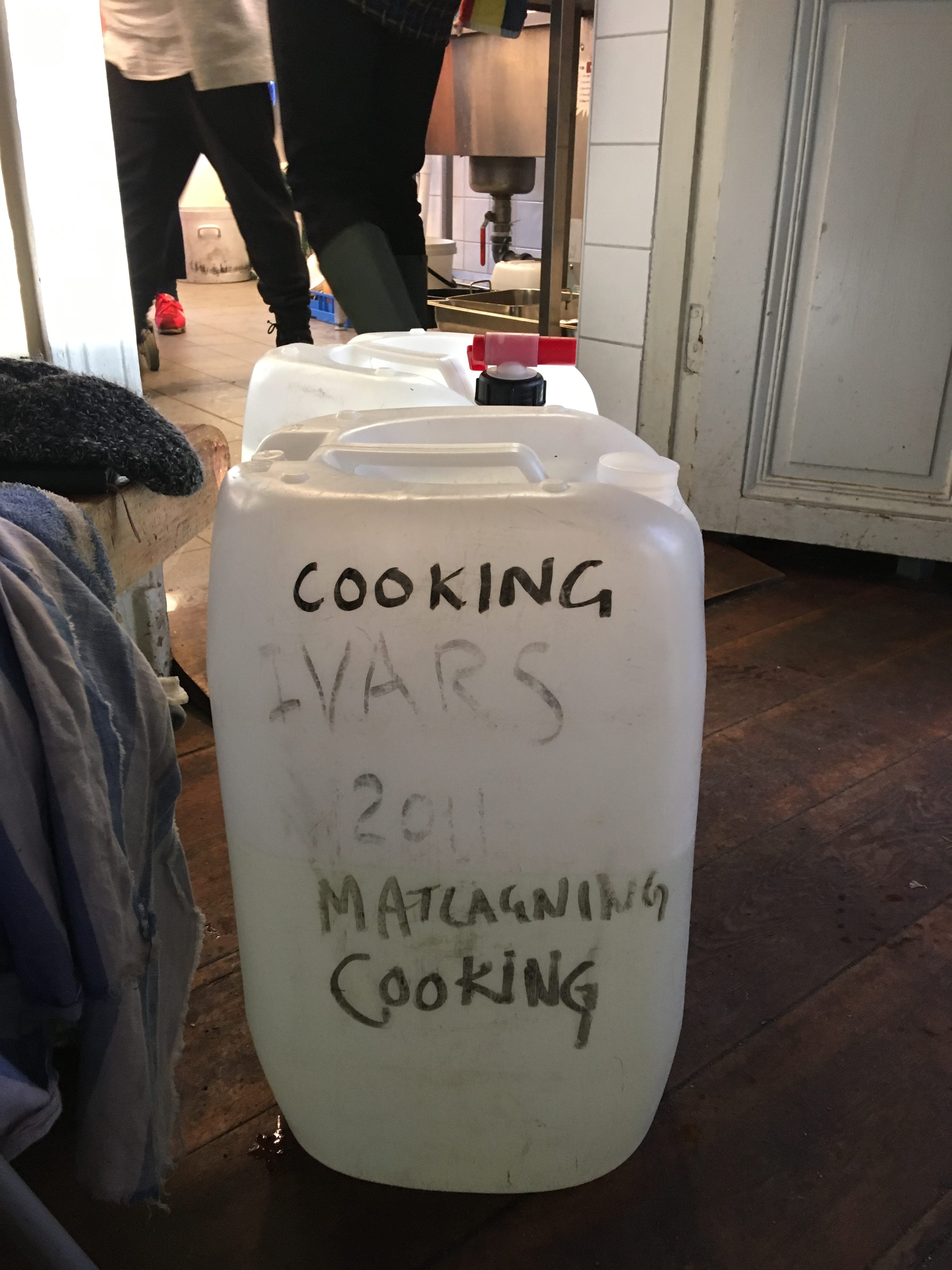
We often wonder why we think k.ö.k is so important to us, why we want to continue working together and, not least, how we should continue. That k.ö.k is crucial for us, we have no doubts, but why? Of course, there are as many reasons as there are members, and so that must be. And we know it is enough that we show that we care, to see and listen to each other and to do things together. But we often ask ourselves, what is the difference between k.ö.k and The Women’s Centres’ regular activities; what is different in what we do and how we do it. The question is not entirely easy, and should not be, because we depend on each other. Or if truth be told, k.ö.k is far more dependent on The Women’s Centre than the other way around, and for the key reason that k.ö.k has grown from The Women’s Centre. In this way, we see ourselves as a little sister to The Women’s Centre. The Women’s Centre is an organization that actively mobilizes women, and organizes regular activities that women can participate in to learn new things, whereas kök is more of a place where we, at a very slow pace, together think through what it means to practice feminism in a global order, what you mind call a kind of feminist course where we learn from each other. Perhaps the most important thing we try to practice is radical care, which for us is about developing strategies for how we can take care of each other in precarious times. How can we take care of each other so that we survive, mentally, financially, physically and politically. The Women’s Centre practices radical care on a daily basis, which k.ö.k is inspired by and learns from. Together with members of the The Women’s Centre and kök, we collectively try to think about how we can share this practice with others. How to attend to the immediate needs of everyday life and the long-term slow common thinking about struggles and sicknesses, which we see as both equally important and indispensable in a collective feminist practice. The relationships between the various activities and the platforms are something that we want to continue to think through, and work with. And something we will definitely return to many times.